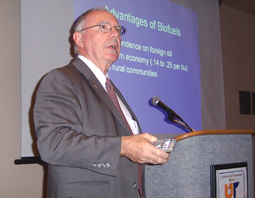Ethanol plant comes home
Byford discusses nearby energy facility plans
- November 14, 2006
- |
- Will York, Managing Editor
- Section: Cover
If all goes as planned, Northwest Tennessee could become a regional renewable energy hub.
As unlikely as it may seem, fields in Obion County, only about 10 miles from UTM, may yield up to 100 million gallons of ethanol per year to be used as a vehicular fuel source.
Jim Byford, dean of UTM’s College of Agriculture and Applied Sciences and ethanol plant investor, spoke to UTM students Monday about the 240-acre, $158 million project, temporarily slated for an April 2008 opening.
Ethanol, a type of alcohol, has garnered increased attention from both politicians and environmentalists as a replacement for petroleum-based fuels. Ethanol can be manufactured from corn,—which will be the source for the Obion facility—soybeans or “biomass,” any natural product with cellulose. Many studies have shown ethanol to be significantly more environmentally friendly than gasoline, and using ethanol in place of petroleum-based fuels decreases the United States’ dependence on foreign oil sources and helps farming and rural communities, Byford said.
He added biofuels like ethanol might cost less than gasoline, too. Ultimately, ethanol prices will be market-controlled.
Some have argued against the practicality of using ethanol as a fuel source, citing studies showing more energy is needed to produce ethanol than the amount of energy in ethanol, but Byford was quick to rebut that argument.
“That’s based on a Cornell study done 25 years ago,” Byford said. “It may have been less efficient 25 years ago, but a lot has changed in 25 years.”
Byford and a conglomeration of local investors partnered with two multinational corporations in securing construction financing: Virgin Fuels, related to the more famed Virgin Records owned by Richard Branson, and Ireland-based NTR-Bioverda. Together, the new company, Ethanol Grain Processors, will be the second ethanol processing facility in Tennessee, following a plant in Loudon County into the growing ethanol market.
Investors hope to finalize bank funding in December, with construction to begin in January.
While Ethanol Grain Processors’ plant will use corn, half of which will be produced locally, Byford said in the future, biomass would make more sense for Tennessee, since half of Tennessee’s acrage is forest, and the state is the No. 1 hardwood producer in the United States. Biomass facilities use bacteria to convert the cellulose in wood to ethanol.
“Ethanol is something that’s going to be here to stay for quite a while,” Byford said. “And it only makes sense to involve UTM once the plant gets off the ground.”
He said the facility may use UTM students for interns.
Byford’s talk was sponsored by the UTM Center for Global Studies.
Paul Crapo, the center’s director, said, “We sometimes forget our own faculty, staff and administration are involved in interesting and timely international projects, and that’s certainly the case today (with the ethanol facility) ... All economics is international.”

Jim Byford, dean of the College of Agriculture and Applied Sciences and investor in a future ethanol production facility about 10 miles from campus, speaks to students on the benefits of the environmentally friendly fuel and the $158 million facility.